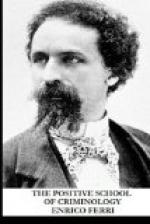At that period, Pinel advanced the revolutionary idea that insanity was not a sin, but a disease like all other diseases. This idea is now a commonplace, but in his time it revolutionized the world. It seemed as though this innovation inaugurated by Pinel would overthrow the world and the foundations of society. Well, two years before the storming of the Bastile Pinel walked into the sanitarium of the Salpetriere and committed the brave act of freeing the insane of the chains that weighed them down. He demonstrated in practice that the insane, when freed of their chains, became quieter, instead of creating wild disorder and destruction. This great revolution of Pinel, Chiarugi, and others, changed the attitude of the public mind toward the insane. While formerly insanity had been regarded as a moral sin, the public conscience, thanks to the enlightening work of science, henceforth had to adapt itself to the truth that insanity is a disease like all others, that a man does not become insane because he wants to, but that he becomes insane through hereditary transmission and the influence of the environment in which he lives, being predisposed toward insanity and becoming insane under the pressure of circumstances.
The positive school of criminology accomplished the same revolution in the views concerning the treatment of criminals that the above named men of science accomplished for the treatment of the insane. The general opinion of classic criminalists and of the people at large is that crime involves a moral guilt, because it is due to the free will of the individual who leaves the path of virtue and chooses the path of crime, and therefore it must be suppressed by meeting it with a proportionate quantity of punishment. This is to this day the current conception of crime. And the illusion of a free human will (the only miraculous factor in the eternal ocean of cause and effect) leads to the assumption that one can choose freely between virtue and vice. How can you still believe in the existence of a free will, when modern psychology armed with all the instruments of positive modern research, denies that there is any free will and demonstrates that every act of a human being is the result of an interaction between the personality and the environment of man?
And how is it possible to cling to that obsolete idea of moral guilt, according to which every individual is supposed to have the free choice to abandon virtue and give himself up to crime? The positive school of criminology maintains, on the contrary, that it is not the criminal who wills; in order to be a criminal it is rather necessary that the individual should find himself permanently or transitorily in such personal, physical and moral conditions, and live in such an environment, which become for him a chain of cause and effect, externally and internally, that disposes him toward crime. This is our conclusion, which I anticipate, and it constitutes the vastly different and opposite method, which the positive school of criminology employs as compared to the leading principle of the classic school of criminal science.




